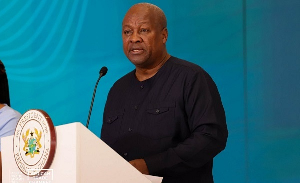Health News of Monday, 20 May 2013
Source: GNA
Attend regular screening for breast cancer, women urged
Dr Beatrice Wiafe Addai, a consultant and breast surgeon, over the weekend appealed to women to go for early and prompt clinical screening for breast cancer detection and medication.
She said the alarming rate at which women were dying to breast cancer and other breast related diseases in the country demands that those within the ages of 35 and 49 ought to undergo regular screening irrespective of their health status.
She said this was necessary as treatment becomes difficult when patients report late for medical attention hence the need for early screening.
Dr Wiafe, who is the President of the Breast Care International, a Non-Governmental Organisation (NGO), was speaking to the Ghana News Agency at Afrisipa, a mining town in the Tano North District of Brong-Ahafo Region.
She granted the interview after more than 500 women had undergone a free breast screening exercise, which was jointly organised by the NGO and the Ahafo Mine of Newmont Ghana Gold Limited (NGGL), to mark the 5th anniversary celebration of Newmont Ahafo Development Foundation (NADeF).
NADeF was established by the Ahafo mine in 2008, to spearhead the execution of sustainable development in the 10 host communities around the mine and NGGL contributes one dollar per ounce of gold produced and one percent of its annual net profit to the foundation.
Dr Wiafe said, it was untrue that breast cancer was caused by witchcraft, explaining that, though breast cancer was the number one killer disease among women, Ghana ranked 10th in breast cancer burden in the world.
She said the National Health Insurance Scheme covers treatment for the disease, and advised those who have been identified with the symptoms, to seek prompt medical care rather than moving from one prayer camp to the other.
Dr Wiafe said breast cancer could only be diagnosed after tests were conducted and advised religious organizations to support patients as they seek to restore their wellness.
She said the NGO had chosen to work in deprived communities due to the fact that women in those areas were the most affected.












